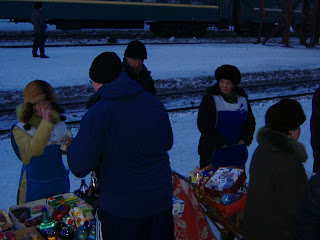
Most of our training involves learning the Nepali language (although other sessions include such diverse topics as earthquakes and diarrhoea). The teachers are really friendly and use a variety of methods. We get lots of homework, which the unsuspecting guest house staff usually bear the brunt of.
Although our training includes cultural awareness, we got stuck into Nepali culture on our day off, when we joined in with the Hindu festival of Holi. This is the festival of colours and involved lots of water and coloured dye being thrown around.
Initially we decided against going out amongst the chaos and instead took part in a water fight from the relative safety of the guest house roof:

Unfortunately, this tactic didn’t keep us dry as even the usually sweet and placid Amega (who does the cleaning) got her revenge on us, for not making our beds properly, and delighted in throwing bucketfuls of water over us all:

So we decided we might as well venture out with the following result:

Also, during this Holi-day period, we decided to get our Himalayan experience off to a gentle start by climbing ‘Nagarjun’, a nearby hill. This was a fun, though tiring, adventure which got more interesting when we reached the top only to see a large forest fire now blocking our exit route:

We eventually found our way down, albeit through a military checkpoint. After persuading the armed soldiers that we had a valid reason for not leaving by the main gate, we continued through beautiful countryside and villages:

We eventually arrived weary and relieved back at our Guest House just 4 hours after expected. Luckily we telephoned ahead 10 minutes before a search and rescue operation was launched!
For a bit of a change, we hope to take you on a ‘sensory tour’ of Kathmandu in our next few blogs. We’d also like to make the blogs a bit more interactive so please send us any comments or questions to our email address and we’ll try to respond to them in following posts.

























